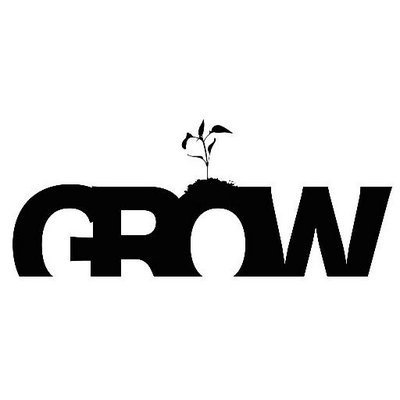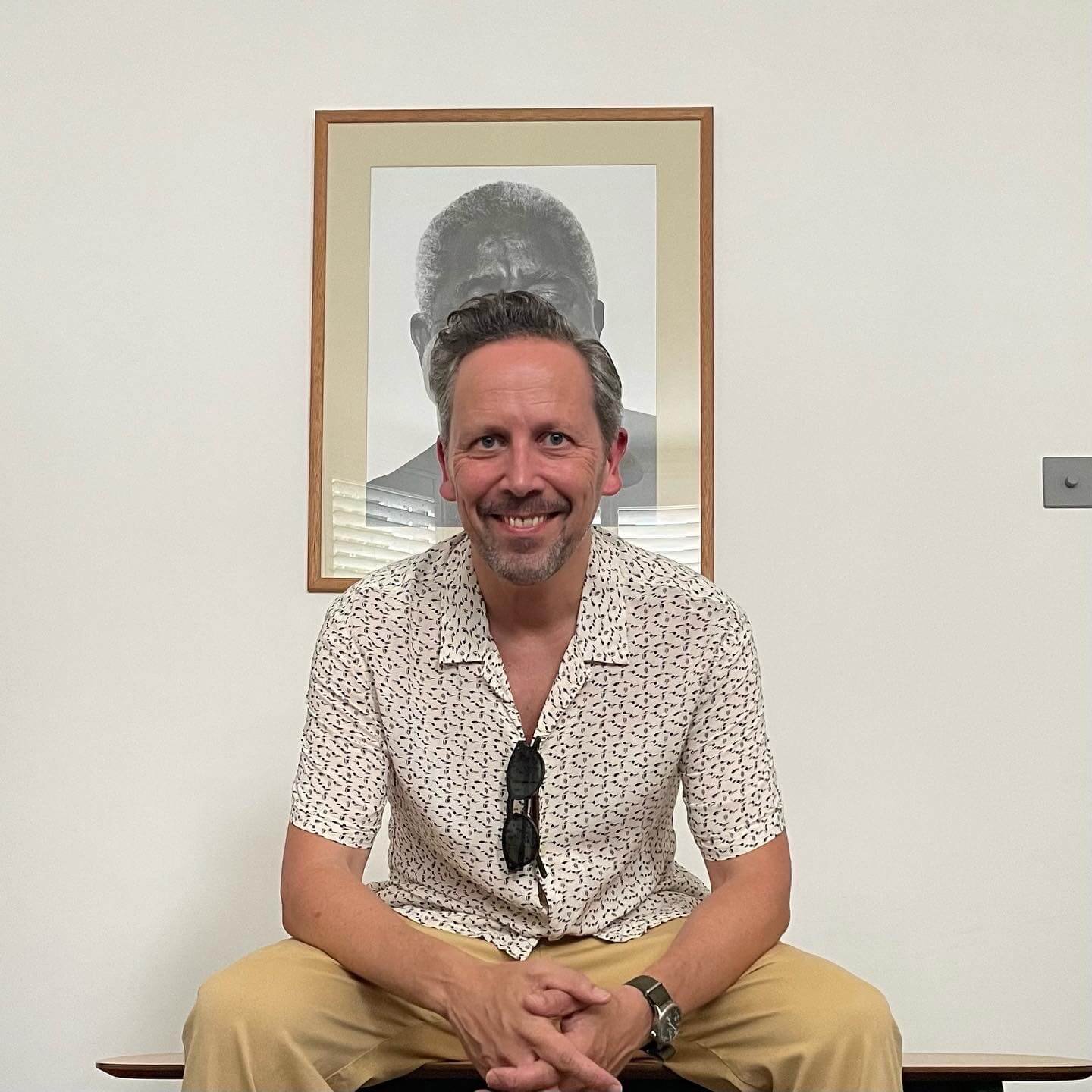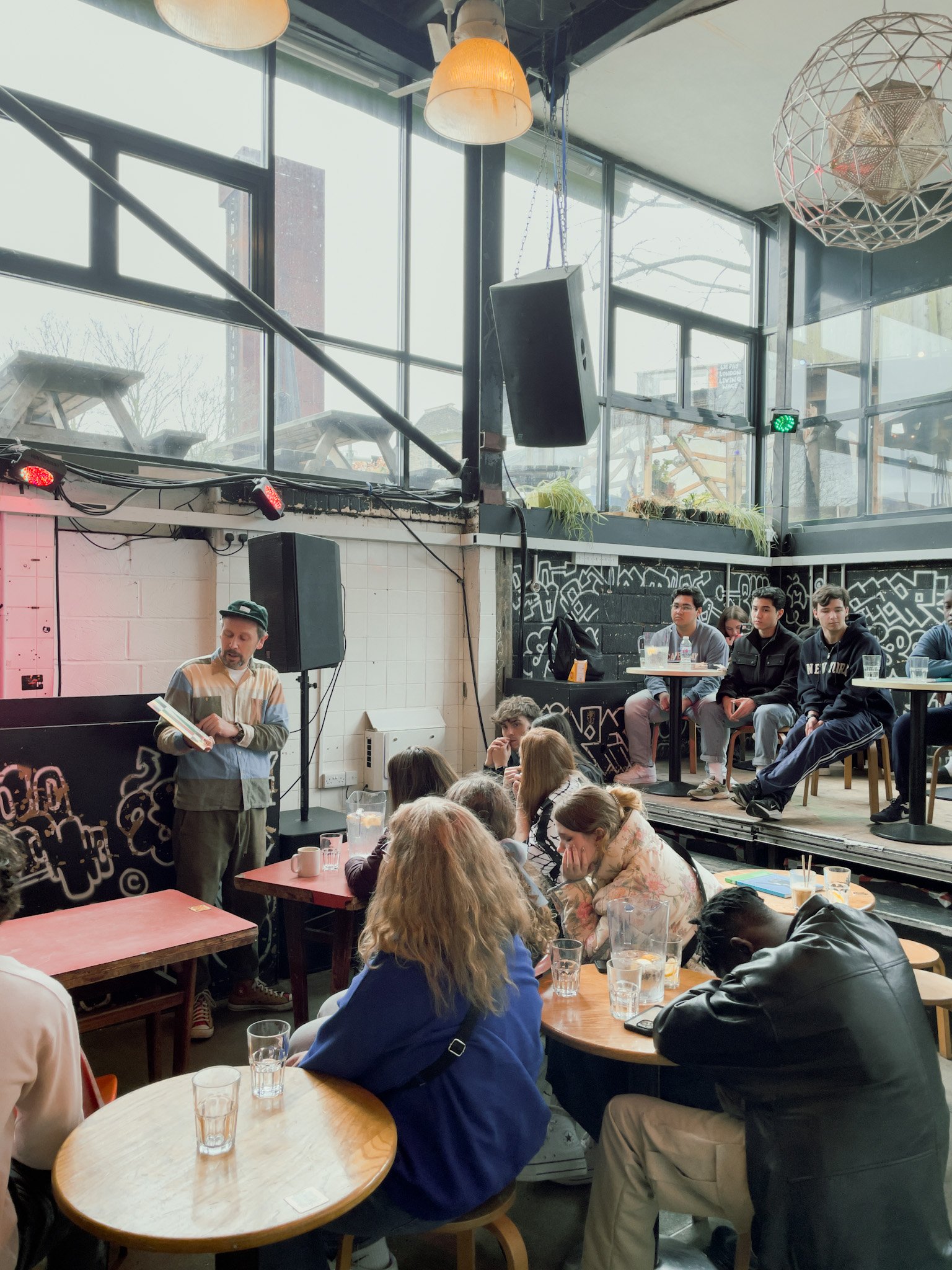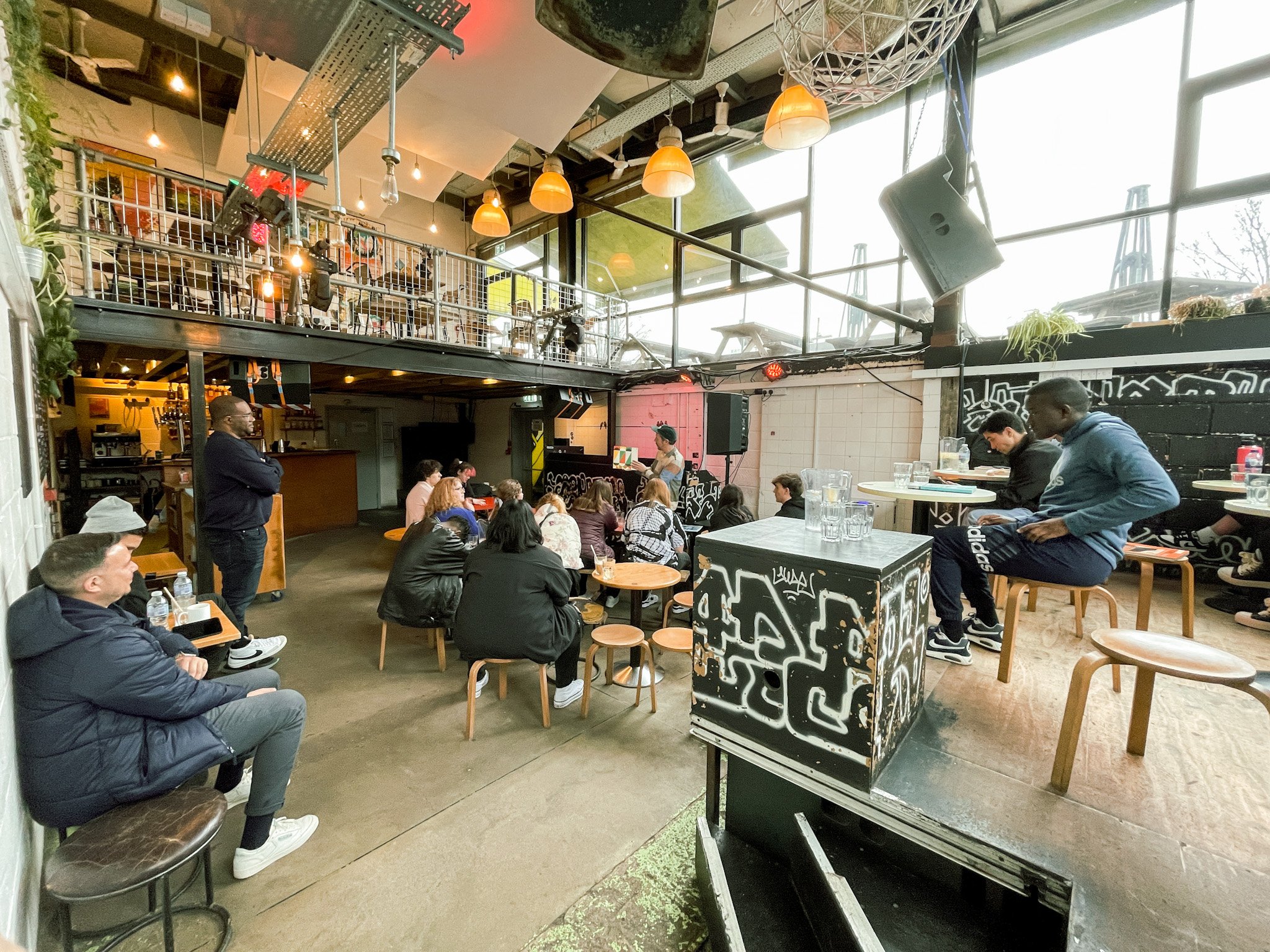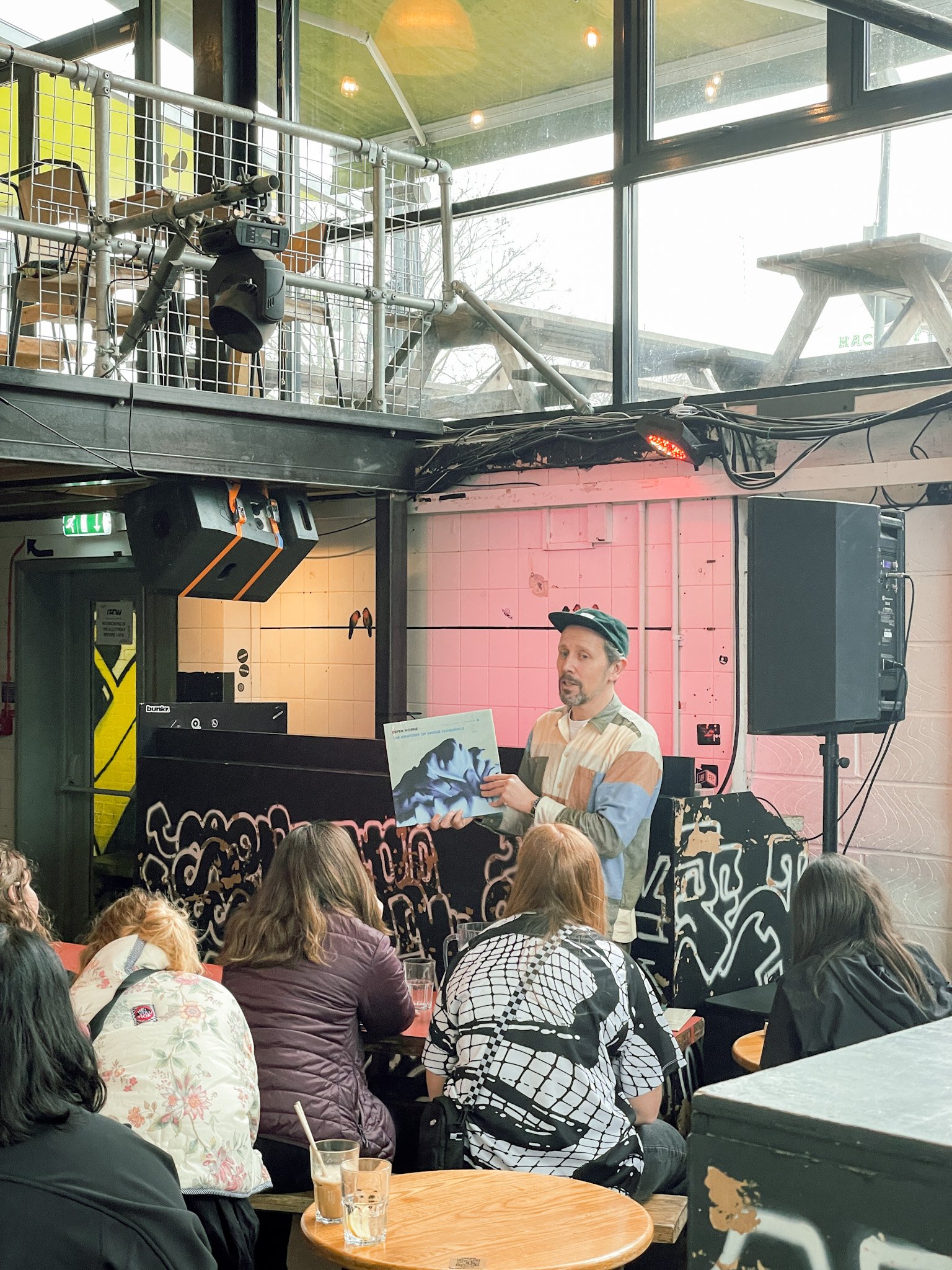Dom Servini and Wah Wah 45s
On Saturday, April 20th at 8PM, the independent soulful record label Wah Wah 45s returns to GROW for a night of eclectic musical goodness with guest ILLAJOY, Handson Family and captain of the Wah Wah ship Dom Servini. This event is bi-monthly and always brings a blend of legendary DJs and up-and-coming live musicians, creating an unforgettable experience for music enthusiasts.
We caught up with Wah Wah 45s with label boss Dom Servini giving us the low down on his captivating journey of this London-based record label, founded by brothers Chris and Simon Goss in 1999. From its humble beginnings as an extension of their eclectic club night to becoming a powerhouse in showcasing emerging talents alongside established acts, Wah Wah 45s has carved a unique niche in the music scene. Join us as we explore the label's evolution, triumphs over challenges, and its ongoing commitment to quality music and cultural exchange. Dom Servini shares insights, anecdotes, and exciting plans for the label's 25th anniversary and beyond.
Can you share with us the origin story of Wah Wah 45s? How did the idea come about, and what motivated Simon Goss, his brother Chris, and others to start this venture in the early '90s?
Wah Wah 45s sprung to life in early 1999 when brothers Chris and Simon Goss decided to take the theme of their Wah Wah club night (a mixture of old and new music played for the dance floor) and release 7-inch records that reflected what they were doing in the club, with a new track on one side and an old one on the flip. At the time they had a weekly Friday night residency at The Jazz Cafe, and Adrian Gibson (the booker there) encouraged them to start the record label.
How did Wah Wah 45s transition from its early underground parties to becoming a recognised label, especially after Simon Goss's involvement with the Jazz Cafe's Friday night sessions?
In the early 2000s, Wah Wah moved from The Jazz Cafe to a number of different venues and was pretty nomadic for a while. We held our I Love Wah Wah parties in Shoreditch before moving to Clockwork in Angel, Islington and finally making a new home at Cargo in Shoreditch for a number of years. Cargo (THE place to be in London at the time) really helped increase our profile, and after I joined the label later in 1999 (having started as a DJ with SImon and Chris at The Jazz Cafe) we started to release records with more contemporary acts such as Aaron Jerome (SBTRKT), Max Cole, Allison Crockett, Talc and Unforscene. Our night at Cargo gave us the opportunity to showcase these acts on a proper live stage alongside our DJ sets and Wah Wah Live was born. This definitely aided the rise of the record label.
You joined Wah Wah 45s in 1999. Could you tell us about your initial involvement with the label and how you contributed to its growth and development alongside Simon and Chris Goss?
I started as a resident DJ at The Jazz Cafe (where I'd been playing Sunday afternoons since 1993) in 1999, just after they had started the label. With Chris' label Hospital records starting to take up all of his time, they soon asked if i would join the label, and having done so, I made it my priority to start releasing records by younger, contemporary artists and, where possible, sign album deals with them. This had never been done before on the label, which had previously only put out one-off 45s.
After Simon's passing in 2010, how did you and Adam Scrimshire continue to uphold Simon's vision for Wah Wah 45s? What were some of the challenges and successes during this time?
After Simon sadly passed away, it was a huge challenge just to get over the emotional hurdle that was created, but at the same time it spurred us on to keep building the label in Simon's memory. One result of that were the Simon Says events which ran at The Jazz Cafe for ten years and raised tens of thousands of pounds for the Roy Castle Lung Cancer Foundation.
Adam had started as an artist on the label (having met him rather drunkenly at a house party one night) but his background in advertising and tech savvy nature made him the obvious choice to join me on taking the label forward. Despite this, the early 2010s were difficult days for the label, with the soul/jazz music scene not being at its most fashionable height and the industry still recovering from the disappearance of vinyl and 'wild west" of digital downloads as it was then.
We moved forward, perhaps subconsciously steering the label towards more reggae and Afrobeat related releases with the signing of Dele Sosimi in 2015 being a real benchmark in the label's history.
With Chris returning to the label and its 25th birthday approaching, how do you envision Wah Wah 45s evolving in the coming years? Are there any specific goals or projects you're particularly excited about?
Chris provides an advisory role in the label these days as Hospital remains an iconic UK label that keeps him very busy, but nevertheless, the future for Wah Wah 45s is very exciting indeed. Our 25th anniversary has been a very special one so far with much loved historic artists like Jamie Finlay and Espen Horne returning to the fold with some incredible music, and Dele Sosimi finally releasing a new LP with his Estuary 21 project. We're also busy releasing new music from up-and-coming artists like Lawne and Léa Mondo, and have at least two or three more very exciting signings to announce before the year is out... and then there our regular Wah Wah Live nights at Grow of course - which we just LOVE! And the forthcoming 25th Anniversary Party at Village Underground in September, as well as ones to be announced in Bristol and Manchester.. so yes, we're busy!
Wah Wah 45s has been deeply connected to the music community throughout its history. How do you see the label's role in supporting emerging artists and contributing to the wider music scene?
Supporting emerging artists is at the very heart of what we do, despite working with some incredible, well respected veterans, we always make sure we work with up-and-coming acts that fit our ethos. It's great to watch them grow, and it helps us stay relevant of course! ;))
Looking back at the label's journey so far, what do you believe has been Wah Wah 45s' greatest contribution or impact on the music industry? How do you hope it will be remembered?
I hope that we've stayed true to our ethos of only releasing great songs that we believe in into the world. One great song can improve your life immeasurably, so I hope we've made the world a little bit better in that way. I hope we'll be remembered in the 22nd Century as that rare groove label that started at the turn of the century before and is still going after a hundred year.
What does Wah Wah 45s mean to you? Could you share a fond memory or milestone that stands out to you from your time with the label?
It's my family. Not just Chris, Simon and Adam, who've been like brothers to me, but all of the wonderful artists I've met along the way (whether things worked out or not) and all of the extended music family that I love so dearly. The UK's soul/jazz/dance (whatever you wanna call it) music scene is something very special and quite unique I think. Everyone knows everyone, and there's a lot of love that goes around.
A few fond memories / milestones:
First hearing a demo of Modern Sleepover by Talc at a friend's flat and it completely blowing my mind.
Alison Crockett's incredible performance, whilst heavily pregnant, at Cargo around 2003.
Our 10th birthday at The Scala in London.
The love and incredible amounts of emotion in the room at the first ever Simon Says.
Getting our first playlist on BBC 6 Music with Isaac Birituro & The Rail Abandon.
And I'm sure our 25th birthday party later this year will be another one....
You recently participated in a talk at GROW with students from Philadelphia, USA. How do you believe initiatives like this contribute to Wah Wah 45s' mission of fostering music education and cultural exchange?
I love these talks. I've been doing them for a different group of students from Philadelphia every year for the best part of a decade. Initiatives like this are absolutely essential for me, and the label, to help us understand such demographics from the other side of the world, as well as help them to have a greater understanding of how the independent music sector works, how it struggles, and what they can do to help ensure it survives.
What were some of the topics discussed during the talk with the American students, and how did they respond to learning about Wah Wah 45s and its ethos? Did you find any common ground or differences in perspectives that stood out to you?
As usual we spoke a lot about how the artists are discovered, the mechanics of releasing music in the modern era, and as always we spoke about the more cultural issues we face by living in London, in particular gentrification and its effect on communities, nightlife and the music scene in general. As always, it's so interesting to compare how this is in London to the story in Philadelphia. We often find that things are quite similar!
As someone deeply involved in music and culture, how important do you think it is to educate young people about different musical genres and cultural movements? What do you hope the students took away from their interaction with Wah Wah 45s and Grow?
It's the most important thing. We live in a world where people are spoon fed music and algorithms and AI help decide what you listen to. It's difficult to be completely free with your choices, and often when I speak to the students there are whole genres they're not even aware of. Of course, this can also be said of me, which is why such an exchange outside of the algorithm is so vital! I hope the talk helped the students understand this and that they look and listen "outside of the box" as much as possible in the future.
